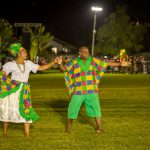We were in the shadow of my grandmother’s wooden house. The sun was almost in the middle of our sky and the tin roof made little crackling sounds as if retaliating against the heat. I sat on a wooden bench, between my grandmother’s thighs with my elbows on her knees, as she gently tugged the knots from my kinky tresses. She was humming Amazing Grace, with a baritone sound that vibrated throughout her body and my soul. I wanted to stay there, enveloped in her warmth.
“Nice day for river, Mama,” I said.
“Wi doodoo,” she answered. “But today is to pack your things.”
My heart sank and I felt a lump form in my throat. Going back home meant leaving the river with its crayfish and veo, the roasted breadfruit, rolling in boiled bay leaves and its pungent aroma, the scent of the coconut oil that overpowered the outdoor kitchen.
“I know,” I managed to say.
Her hands moved down my back finishing the last of the braids, my going-home hairstyle.
“Bèl fi mwen,” she said when she was done, passing her greasy hands on my face.
My grandmother handed me the comb and oils, and I took them to the bedroom, carefully placing them on the cloth-covered plastic barrel that served as her dressing table. Stacked in a corner, were bags in which she kept her clothes, but she wore the same stained garbs repeatedly. She rarely used shoes, preferring to walk, and garden barefoot.
I reached for my knapsack and found my doll inside, its brown eyes staring at me, its plastic body fragile in my hands. I couldn’t do without it at home, but I hardly touched it out here. My cousins didn’t play with dolls; they played with whatever was around them – sticks, bottle covers. Whereas I combed dolls’ hair, they plaited the long grass that grew abundantly. I climbed stairs; they climbed trees. I showered in a cubicle; they frolicked in the river or danced in the rain. I watched television; they played cricket in the dirt or hide and seek in the woods. I read books; they told each other stories.
My grandmother called me. I wiped my eyes and went outside. She was still sitting in the chair, her braids which I had done the day before, ruffled. She pulled me into her arms and I buried my face in her ample breasts. She smelled of sweat and smoke and love.
“I want to stay,” I cried.
She rubbed my back. “You have everything in town, fi mwen. Family, comfort, good education.”
I nodded but the tears wouldn’t stop and I held on to her trying to blend her scent with mine.
Later that day I said good-bye to relatives and friends.
*
The next day my grandmother woke me long before the sun peeked over the mountain. She lit the booseye and held it as I brushed my teeth outside, shivering with cold. She made coffee in the outdoor kitchen – strong for her, light for me.
By the time the land was grey and birds were saying good morning, we were trekking down the mountain, winding through well-tread tracks that were crisscrossed with roots from bay leaf trees. Clad in a sweater and one of my grandmother’s large church hats, I carried my knapsack on my back, containing my clothes, smoked meat, spices, and herbs. In my hand, I held my grandmother’s plastic shoes. She wore a red dress she’d taken from one of her bags and had covered her hair with a madras bandana. She carried a crocus bag of provisions on her head, sometimes without holding it. She had used an old skirt to form a ring which she called a tosh, and crowned herself with it, before heaving the bag on her head. I had seen her do that with buckets of water that she carried from the sous because her house had no indoor plumbing. When we got to the bottom of the mountain, she rinsed her feet in the stream that trickled through the path and we stepped on stones to the other side. After she put on her shoes, we walked to the intersection where we waited for the truck that would take us to town. Some of the villagers asked me if I had a good time and I had to fight the urge to cry. Summer was over.
“De lorry coming,” my grandmother said.
Soon after, we heard the rickety sound of Sullivan’s Bedford. He was our relative, as were numerous villagers. I liked him and he often brought me delicious cakes from their bakery. The bed of the truck was long, with wooden side panels and a covering of patchwork plywood. Sullivan and two men climbed up there, and people lifted items to them– tubs of rum, bunches of green bananas, cane, bags of provisions, and other bulky items. After they secured them with rope, Sullivan hoisted me into the truck’s box. There were wooden seats across the bed from panel to panel, which reminded me of church pews. My grandmother and I sat closest to the cab and I could glimpse the road above its sun-bleached roof.
Sullivan closed the tailboard. “Tout moun pawé?” he asked.
People answered “wi,” “yes” and “annou alé!”
The engine sputtered to life and my grandmother made the sign of the cross as the truck lurched forward. It rocked us through the mountains moving slowly over unlevelled roads and ridges; rickety, rickety along mountain passes. My grandmother pulled me into her lap and I eventually faded into slumber.
I was dreaming of falling into nothingness, and for a moment it felt surreal until I was jolted awake by piercing screams and a roaring noise. My voice joined the cacophony, and my heart thundered as my body tumbled and tumbled, piling on flesh, colliding with wood and metal. Crashing sounds reverberated as wood smashed to splinters and trees snapped apart. My body hurtled through a void and I felt my bones shatter on impact.
Then darkness.
I opened my eyes to a cloudless sky; to agony and wreckage. Fragments of wood and trees. Decimated items. Mangled bodies; some groaning, some soundless. Remnants of the truck lay in the ravine, like crushed foil. Everything felt dreamlike. I tried to move; it felt like fire was searing my legs. I turned my head slightly and saw red tattered material splayed about a blood-soaked figure with a face so distorted I howled. Blood and dirt trickled from my mouth.
Voices floated around me, muffled, as if through cotton. Stupefied, I heard few words – two, blood. I felt my nerves tearing and I wailed as rescuers pulled my battered body to free my legs.
I woke in casts and bandages, hooked up to machines, with my mother fussing over me, her one legged daughter. “Where Mama?” I mumbled when I became lucid.
“Recovering from surgery,” she sniffled. “She’ll never walk again.”
“And Sullivan?”
She shook her head. Only seven people survived.
I felt as if something was crushing my heart and my body shook as I sobbed in my mother’s embrace. “We. Still. Have. Mama.”
“Yes we do,” she cried. “We have both of you. Praise God.”
















6 Comments
This was another great piece Lisa. You always have me craving more !
Lisa, this story brought back childhood memories. How sweet and creative of you to relate to so many of us from all walks of life especially those of us from the Caribbean.
Thanks for sharing your creative work and I look forward to reading a lot more.